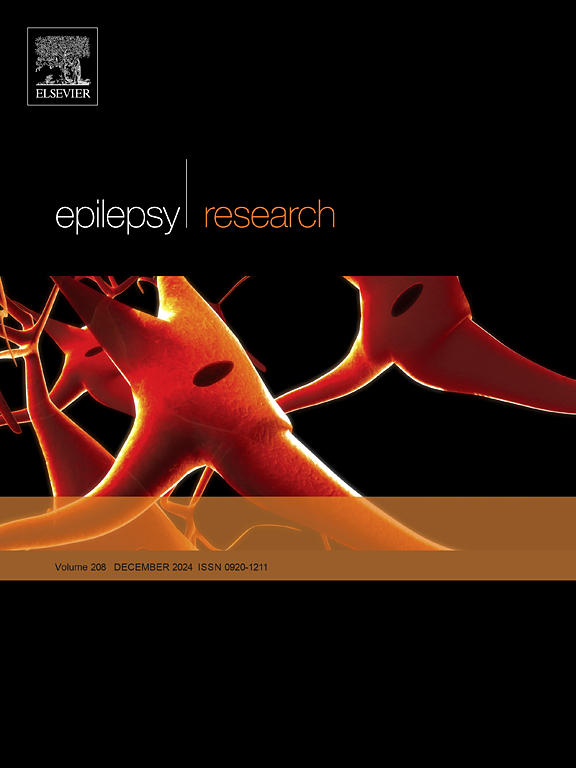癫痫患者中的精神病和精神分裂症:系统回顾和荟萃分析。
IF 2
4区 医学
Q3 CLINICAL NEUROLOGY
引用次数: 0
摘要
背景:先前的研究表明,癫痫与精神病之间存在关联。本综述旨在估算全球癫痫患者中精神病和精神分裂症的患病率,并评估癫痫患者(PWE)中患精神病和精神分裂症的几率:利用相关关键词在 PubMed/MEDLINE 和 Scopus 上进行了全面的文献检索,时间跨度为 1990 年 1 月 1 日至 2023 年 11 月 18 日。荟萃分析使用 R 软件进行,采用随机效应模型确定癫痫患者中精神病和精神分裂症的总体患病率和几率比(OR),以及 95 % 置信区间(95 % CI):共有 81 项研究符合纳入标准,涉及 970,497 名病患。荟萃分析表明,精神病和精神分裂症在残疾人中的总体患病率分别为 7.8 %(95 % CI:6.3-9.2 %,I2 = 100 %)和 3 %(95 % CI:1.7-4.3 %,I2 = 95 %)。此外,癫痫与精神病发生几率增加三倍有关(OR = 3.41,95 % CI:2.3-5.08,P 值 < 0.01,I2 = 99 %,P 异质性 < 0.01)。此外,研究还发现癫痫与精神分裂症几率增加五倍有显著相关性(OR = 5.22,95 % CI:2.99-9.11,p 值 < 0.01,I2 = 94 %,p 异质性 < 0.01)。有必要进行更多的纵向研究,以阐明癫痫及其治疗对精神病和精神分裂症风险的影响,同时还需要对混杂因素进行全面的调整。本文章由计算机程序翻译,如有差异,请以英文原文为准。
Psychosis and schizophrenia among patients with epilepsy: A systematic review and meta-analysis
Background
Prior research has indicated an association between epilepsy and psychosis. This review aimed to estimate the global prevalence rate of psychosis and schizophrenia in epilepsy and assess the odds of psychosis and schizophrenia among patients with epilepsy (PWE).
Method
A comprehensive literature search was carried out utilizing relevant keywords in PubMed/MEDLINE and Scopus, covering from January 1, 1990, to November 18, 2023. The meta-analysis was performed using R software employing a random-effect model to establish the overall prevalence and odds ratio (OR), with 95 % confidence intervals (95 % CI), of psychosis and schizophrenia in epilepsy.
Result
Eighty-one studies encompassing 970,497 PWE met the inclusion criteria. The meta-analysis revealed that the overall prevalence of psychosis and schizophrenia among PWE was 7.8 % (95 % CI: 6.3–9.2 %, I2 = 100 %) and 3 % (95 % CI: 1.7–4.3 %, I2 = 95 %), respectively. Moreover, epilepsy was associated with a threefold rise in the odds of psychosis (OR = 3.41, 95 % CI: 2.3–5.08, p-value < 0.01, I2 = 99 %, p-heterogeneity < 0.01). Furthermore, epilepsy was found to be significantly correlated with a fivefold increased odds of schizophrenia (OR = 5.22, 95 % CI: 2.99–9.11, p-value < 0.01, I2 = 94 %, p-heterogeneity < 0.01)
Conclusion
Epilepsy can increase the risk of developing psychosis and schizophrenia. Additional longitudinal research is warranted to elucidate the influence of epilepsy and its treatments on the risk of psychosis and schizophrenia, and also a comprehensive suite of confounding adjustments will be requisite.
求助全文
通过发布文献求助,成功后即可免费获取论文全文。
去求助
来源期刊

Epilepsy Research
医学-临床神经学
CiteScore
0.10
自引率
4.50%
发文量
143
审稿时长
62 days
期刊介绍:
Epilepsy Research provides for publication of high quality articles in both basic and clinical epilepsy research, with a special emphasis on translational research that ultimately relates to epilepsy as a human condition. The journal is intended to provide a forum for reporting the best and most rigorous epilepsy research from all disciplines ranging from biophysics and molecular biology to epidemiological and psychosocial research. As such the journal will publish original papers relevant to epilepsy from any scientific discipline and also studies of a multidisciplinary nature. Clinical and experimental research papers adopting fresh conceptual approaches to the study of epilepsy and its treatment are encouraged. The overriding criteria for publication are novelty, significant clinical or experimental relevance, and interest to a multidisciplinary audience in the broad arena of epilepsy. Review articles focused on any topic of epilepsy research will also be considered, but only if they present an exceptionally clear synthesis of current knowledge and future directions of a research area, based on a critical assessment of the available data or on hypotheses that are likely to stimulate more critical thinking and further advances in an area of epilepsy research.
 求助内容:
求助内容: 应助结果提醒方式:
应助结果提醒方式:


